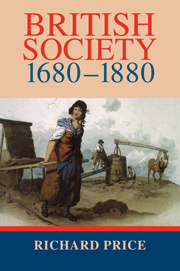Book contents
- Frontmatter
- Contents
- Preface
- Acknowledgments
- Introduction: beginnings, periods and problems
- 1 The economy of manufacture
- 2 A universal merchant to the world: the political economy of commerce and finance
- 3 The ambiguities of free trade
- 4 The reach of the state: taxation
- 5 The age of localism
- 6 The public, the private and the state: civil society 1680–1880
- 7 Exclusion and inclusion: the political consequences of 1688
- 8 Exclusion and inclusion: defending the politics of finality 1832–1885
- 9 The stabilities and instabilities of elite authority: social relations c.1688–c.1880
- Afterword
- Index
7 - Exclusion and inclusion: the political consequences of 1688
Published online by Cambridge University Press: 02 December 2009
- Frontmatter
- Contents
- Preface
- Acknowledgments
- Introduction: beginnings, periods and problems
- 1 The economy of manufacture
- 2 A universal merchant to the world: the political economy of commerce and finance
- 3 The ambiguities of free trade
- 4 The reach of the state: taxation
- 5 The age of localism
- 6 The public, the private and the state: civil society 1680–1880
- 7 Exclusion and inclusion: the political consequences of 1688
- 8 Exclusion and inclusion: defending the politics of finality 1832–1885
- 9 The stabilities and instabilities of elite authority: social relations c.1688–c.1880
- Afterword
- Index
Summary
The ambiguities of 1688
It is difficult not to be amazed at the ease with which a ruling monarch was dislodged in 1688–89. The revolution of 1688 became the admired centerpiece of the Whig interpretation of modern British history precisely because it was bloodless, gradualist and conservative. But understanding the significance of 1688 for the subsequent history of British politics must begin with recognizing the cynical audacity of the event. It was a coterie of the ruling class – there really is no other name for it – who conspired and collaborated with William of Orange's decision to invade. The gentry of England refused to fight for their constitutional monarch; his closest associates (even members of his own family) deserted him in droves. And it was the Lords and Commons combined who offered the throne to William and Mary with the understanding that they would recognize certain constitutional niceties.
The central nicety, of course, was that the joint monarchs accept limited power and shared governance with Parliament. The dual monarchy of William and Mary – in itself an unheard-of constitutional innovation – was created in negotiation with Parliament. And as if to drive the point home, their reigns were dated from the moment the crown was offered and accepted and not from the date that James II had departed so unceremoniously. The revolutionary quality of 1688–89 lay in the resolution of the problem that dominated and occasionally paralyzed English politics throughout the seventeenth century: how was the principle of monarchy to be reconciled with the presence of representative politics? Naturally, it is only in retrospect that the issue of 1688 may be formulated so exactly.
- Type
- Chapter
- Information
- British Society 1680–1880Dynamism, Containment and Change, pp. 234 - 263Publisher: Cambridge University PressPrint publication year: 1999



